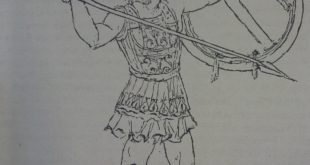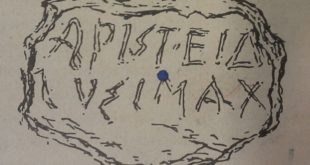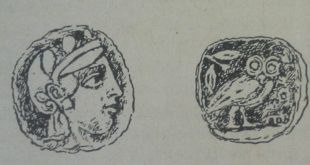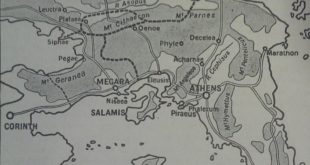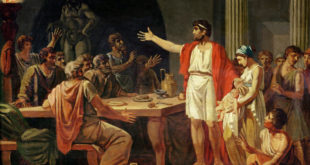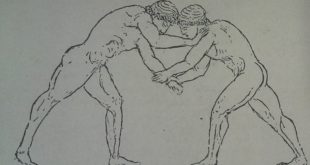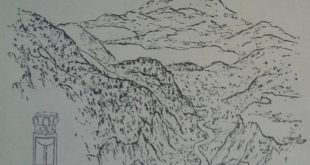Both Sparta and Athens were determined to fight, — so determined that they had behaved outrageously towards Persian ambassadors who had visited them to demand submission. The traditional way of doing this was to ask for “earth and water” but when the ambassadors made this demand in Athens they were thrown into the pit where criminals were put. “Get earth from there”, yelled the citizens. At Sparta the ambassadors were plunged into a well. “Get water from there”, they were told. Throughout history the person of an ambassador has been held sacred and if the Persians had won at Marathon …
Read More »Hellenes – Ancient Greek Mythology
The Ionian Greeks
The Ionian Greeks, who lived on the coast of Asia Minor and the adjoining islands, had produced some of the leading poets and thinkers of the Greek world. Thales of Miletus (640-546 B.C.) predicted an eclipse of the sun and introduced geometry to the Greeks. Pythagoras of Samos (c. 500) won fame as a philosopher and mathematician, although it is not now thought that he discovered the geometrical truth which bears his name (i.e. that the square on the hypotenuse of a right-angled triangle is equal to the sum of the squares on the other two sides). Thales was interested …
Read More »Athenian Democracy
The heroism of Harmodius and Aristogeiton was a myth, but Athenian democracy was not. In the two great wars of the fifth century — the Persian and the Peloponnesian — the Athenians clearly felt they had what would now be called a “way of life” which was worth fighting for. Cleisthenes, although he was of nobler blood than Solon, gave more power to the poor than Solon had done. Nearly all Athenian citizens now had a vote in the Assembly, a body which approved laws discussed in the Council of Five Hundred. The Five Hundred were elected by the citizens …
Read More »A Tyrant Who Was Not Tyrannical
A tyrant’s first problem was to seize power. Peisistratus had to solve this problem three times. In 560 he came before a meeting of the Assembly wounded and bleeding, alleging that his political opponents had attacked him. Sympathisers voted him a body-guard, with the aid of which he was able to seize power, but his opponents soon forced him to take flight. His next descent on the city was made in a chariot, in which he was accompanied by a handsome woman dressed up as Athena. He alleged that his companion was in fact Athena and that she had chosen …
Read More »Solon
One of the young Athenians who must have taken a good deal of interest in Draco’s writing down of the laws was Solon. He came of a good family. His father had been extravagant and this had prompted Solon to become a foreign trader in order to repair the family fortunes. There was no question of his considering himself one of the oppressed. He was a “have” not a “have-not”. Yet Solon was destined to repeal almost all of Draco’s laws and to set Athens on the road to democracy. We first meet Solon as a poet, patriot and soldier. …
Read More »Athens
The legend of Theseus and the Minotaur suggests that Athens had dealings with Crete during the Minoan and Mycenaean Ages. We have no written history of that time, though the discoveries of archaeologists show that the Acropolis, a rocky mass 512 feet high, already had fortifications like those found at Tiryns and Mycenae. At the time of the first Olympiad (776 B.C.) there may still have been a King upon the throne, but at Athens, as in many other Greek states, government by Kings gave way about that time to government by the nobles. Monarchy, that is to say, gave …
Read More »A Spartan grows Up
A Spartan child was examined at birth. A healthy infant was allowed to live. Weaklings were not wanted. They were left in the mountains to die. (Exposure of unwanted children was not peculiar to Sparta. Even civilized 5th-century Athenians practised it.) At the age of seven a Spartan boy left home. His period of family life was finished. Thereafter he would be a member of a community. In modern terms, he would always be either at a boarding school or on military service. In the “pack”, as it was called, the seven-year-old newcomer quickly learned obedience. He had to act …
Read More »Sparta
This striking difference in the way Athens and Sparta treated their victorious athletes reflects a striking difference between the states themselves. Neither was important as a coloniser. But during the 6th and 5th centuries they occupy the centre of the stage. At Sparta living was hard; hence the adjective “Spartan”. In the Mycenaean Age, when, according to legend, Menelaus was King of Sparta and Helen was his queen, the place had not yet gained this reputation for hardness, which was a result of the Dorian invasion. The invaders found the valley of Lacedaemon attractive. They settled there and made the …
Read More »The Olympic Games
At Olympia every four years Olympic games were held in which any Greek was entitled to take part. It is not known when the first Olympic games were held, but they were said to have been revived in the year 776 B.C. and the Greeks used that year from which to reckon dates. The period of four years between each celebration of the olympic games was called an Olympiad. When therefore a Greek writer says something happened in the year of the . . . Olympiad we can calculate the year according to our system and put it down as …
Read More »The Delphic Oracle
The Delphic oracle, the priestess of Apollo, was supposed to have the gift of prophecy. The Delphic Oracle was consulted before a colony was founded, before war was declared and on all sorts of other questions. When a request for advice was put to her through her priests she proceeded to put herself into a trance. She is said to have done this by chewing laurel leaves, drinking water from an underground stream and inhaling an evil-smelling gas which arose through a cleft in the rocks within her shrine (but no traces of this cleft have been found). Finally, seated …
Read More »